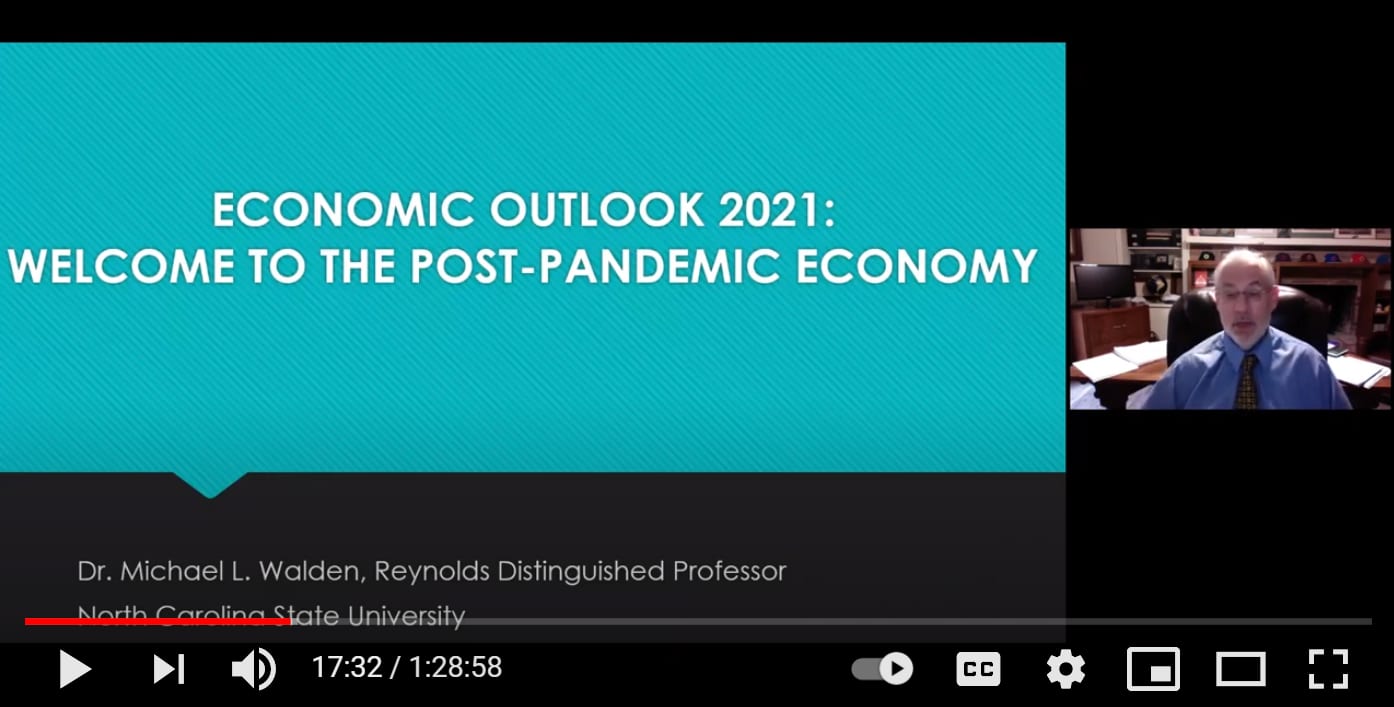Top Five Takeaways from The Chamber’s Economic Outlook Forum

Top Five Takeaways from The Chamber’s Economic Outlook Forum
Top Five Takeaways from The Chamber’s Economic Outlook Forum
By Katie Loovis, The Chamber For a Greater Chapel Hill-Carrboro on March 25, 2021
[This article also appeared in Chapelboro.com]
The Chamber For a Greater Chapel Hill-Carrboro hosted the annual Economic Outlook Forum today as part of the 2021 Critical Issues Series. Renowned economist Dr. Michael Walden kicked off the discussion with his forecast for our national, state, and regional economy. Chamber President and CEO Aaron Nelson followed with an overview of our regional economy and findings from the Chamber's annual local economic conditions survey.
The discussion was loaded with important insights (watch the forum, review the presentations, listen to the 97.9FM radio interview). Scroll down for the summary capturing the top five takeaways:
1) From a macro perspective, Walden underscored that the national economy is improving but the post-pandemic economy will look different from the pre-pandemic economy, especially the labor market. He emphasized major disruptions in the types of jobs that will be available as technology and automation expands, leaving behind many workers, especially those at the lower runs of the economic ladder who will need to reskill. Going forward, proactive community colleges will play an important role in collaborating with employers to help manage the migration of workers from one set of jobs to another. This will likely lead to an increase in post-high school on-the-job training and apprenticeships.
2) From a micro perspective, Nelson emphasized that the Greater Chapel Hill-Carrboro economy is often late into and early out of recessions, and is proving itself resilient once again. He reminded the audience that the top industries in our local economy are “Ed, Med, and Bed” (education, medical services/health care, and tourism), and that the first two have continued to largely maintain wages through the pandemic and will help drive us through the recession and to success.
3) The recession was deep but short according to Walden. 2Q20 (April) was the height of the recession with skyrocketing unemployment. A quick rebound followed starting in 3Q20 largely due to the federal stimulus. The federal response has now totaled $6 trillion, $48 billion of which has gone to North Carolina. This is all borrowed money, which means our future economic growth could be lower, but the alternative would have been to lose a big part of our economy.
4) Local employers are generally split into thirds as to how the current economy affected their business: negatively (32%), not much (39%), and positively (28%), according to Nelson. This insight is from The Chamber’s annual economic conditions survey, which included responses from ~100 local employers of diverse sizes. Nelson emphasized that this finding reflects the same storm, different ships analogy in that some industries fared better than others through the economic contraction.
5) In addition to labor market disruptions, Walden predicts that the national post-pandemic economy will have major implications for education due to distance learning, work-home balance due to teleworking, and control of the skies issues due to drone deliveries. Walden explained that education will be remade as some level distance learning will be incorporated at all levels of education, work-home balance will be adjusted as teleworking is here to stay (20-30% of the workforce will telework post-pandemic verses 8% prior to), and internet and drone deliveries will have major implications for control of the skies and contribute to a reconsideration of where home is. Proximity to work, schools, and shopping will be less necessary and “new farm lifestyle” on cheaper land will be more attractive.
For the Greater Chapel Hill-Carrboro economy, Walden predicts continued and perhaps accelerated growth after the pandemic and reminded the audience that the Durham-Chapel Hill metro area was the 35th highest in growth since 2000. However, he cautioned that more distance learning nationally could result in changes at UNC-Chapel Hill that could impact the local economy.
